 Friday, 10 October 2008
Well, I already knew I was an outlier. And I knew that my number of open windows was part of that eccentricity. But just how much? According to the Engineering Windows 7 blog entry on the taskbar, pretty much everyone peaks at less than 15 open windows, and most people at less than 10:
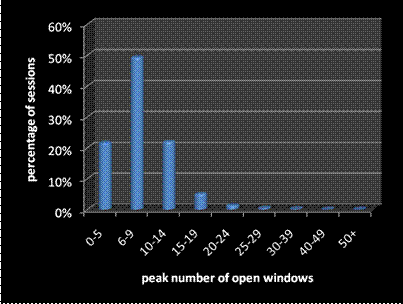
Here's my taskbar at a typical moment:

It's routinely three high. I've never gone to four high, but I have had more open than that. 40 doesn't seem unusual to me (that's 42 there) and I can find my way around in them easily enough. I am a big-time Alt-tabber of course.
Curious how the taskbar, launch pane, start menu, and so on will be different in Windows 7? Want to understand why some features are the way they are (hint: customers are all different, except in the ways they are the same)? Read the blog!
Kate
 Thursday, 09 October 2008
The Engineering 7 blog is really something. These guys are sharing a TON of information about how they decide what will and won't be in the next version of Windows, how it will work, how they will know they're done, and so on. I enjoyed this summary of UAC issues - what they learned from Vista and what they intend to do in Windows 7. Interesting points:
- Intuitively we all know the number of UAC prompts you see should go down over time, because once you have things installed and configured, you don't run the admin apps any more. But they also go down because you used to run old versions of apps that weren't UAC-aware (think Visual Studio 2005 and having to run it elevated most of the time, especially for ASP.NET work) but later you install a newer version that is aware and doesn't have to run elevated (Hello, Visual Studio 2008!)
- The number of different applications that cause UAC prompts "in the wild" is down to about one-fifth of what it was when Vista first released. That's a great success for persuading software vendors to get new versions UAC-aware.
- They plan to add information to the dialogs in Windows 7 so you will understand more clearly what you are being asked to approve.
Can't wait to get to the PDC and learn even more about what Windows 7 will have in store for us!
Kate
 Wednesday, 08 October 2008
I know, I know, what could we possibly learn about C++ in 2008 by reading yet another interview with Bjarne? Well, as it turns out, I did learn some new things, so you can too. Like that the name was chosen to be short because some folks were calling C "old C" to distinguish it from "C with Classes" which was too long to say often. And after quite rightly disclaiming that "what would you do differently if you could do it over" is an unanswerable question, he answers among other things "I would have developed templates (key to C++ style generic programming) before multiple inheritance (not as major a feature as some people seem to consider it) and emphasized exceptions more." Wow! Or how about this quote:
If you look at some of the most successful C++ code, especially as related to general resource management, you tend to find that destructors are central to the design and indispensable. I suspect that the destructor will come to be seen as the most important individual contribution -- all else relies on combinations of language features and techniques in the support of a programming style or combinations of programming styles.
Another way of looking at C++'s legacy is that it made abstraction manageable and affordable in application areas where before people needed to program directly in machine terms, such as bits, bytes, words and addresses.
I do love destructors and deterministic destruction, can't deny it. The article is definitely worth a read!
Kate
 Tuesday, 07 October 2008
Greg Low, Australian RD, has recorded a four-part webcast on Speaking at Large Events such as TechEd. These are full of good advice.
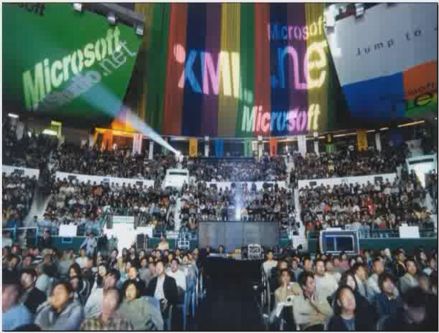
My advice to those who want to speak is pretty simple: start speaking. Your user group, code camps, heck start with your dog if you can't get invited anywhere. In fact, start with your dog for rehearsals even if you do get invited somewhere. Just hearing yourself get all tangled up and lost 5 minutes into the talk will impress upon you the need to have an outline and a plan, to rehearse, and not to try to memorize every sentence. Every time you give a talk you will get better, and every time you hear one you will get better, so go to things. A lot of things.
Greg covers some nice practical details that I won't repeat - watch his videos!
Kate
 Monday, 06 October 2008  Sunday, 05 October 2008
We have Team Systems hooked up to our Active Directory, which is great. It knows who created a work item (or closed it, or edited it) by who is signed in. The dropdown of who to assign things to is prefilled based on who works here. I love it. But recently we removed someone from AD, because she has left the company (to go work in a business owned by one of her family, not that the reason matters to AD or VSTS.) And that led to a problem when I went to save a work item she'd created.
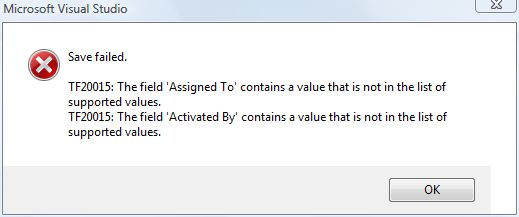
Of course I can fix the "Assigned To" - after all, if I want to see this work item completed, it's pointless to leave it assigned to someone who doesn't work here any more. But "Activated By" - not so much. I can't edit that field and I wouldn't want to anyway, the value has historical meaning.
So, what to do? Neno Loje explains. You change the work item definition so that once something has been validated, that is allowed as a value going forward. You might not want to use it on the Assigned To field, but I sure want it on Activated By.
Kate
 Saturday, 04 October 2008
I guess I haven't opened a CHM (compiled help) file in a really long time. So when I downloaded one (an installation guide) and it didn't really work properly, at first I didn't know what to do:
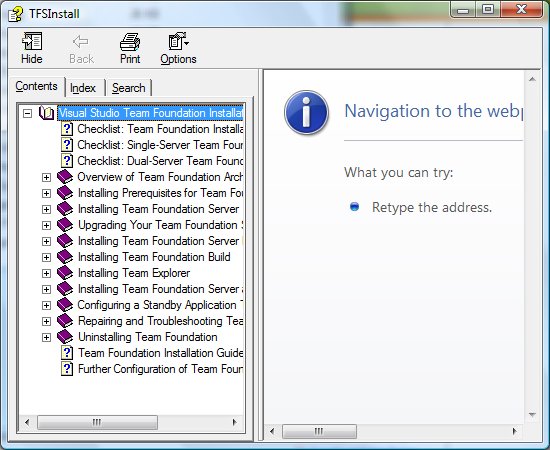
So, off I went searching and I found this fix. Some folks blame Vista, others say it's been that way since XP SP2, still others say it's about your browser (IE 7) not your OS. Whatever. Bill Evjen has had the fix on his blog for YEARS. I right-clicked the file, looked down at the bottom for an Unblock button, and clicked it. Presto!
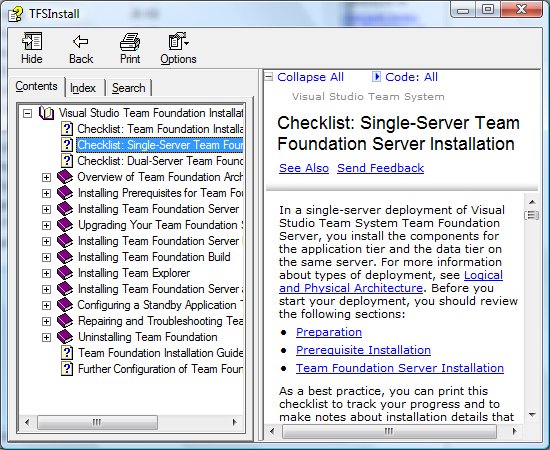
I've said for a long time, an enormous benefit of the RD program is getting introduced to other RDs. Thanks Bill!
Kate
 Friday, 03 October 2008
© Copyright 2026 Kate Gregory
Theme design by Bryan Bell
newtelligence dasBlog 2.3.9074.18820   | Page rendered at Friday, 27 February 2026 12:06:08 (Eastern Standard Time, UTC-05:00)
|
On this page....
Pluralsight Free Trial
Search
Navigation
Categories
Blogroll
Sign In
|